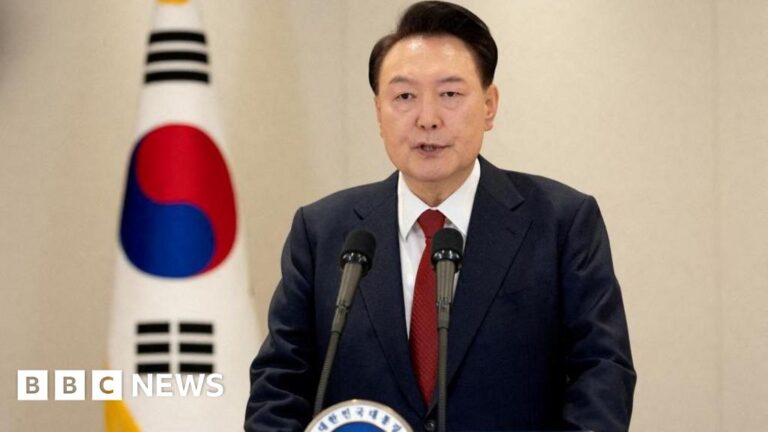A Seoul court has issued an arrest warrant for suspended South Korean President Yoon Suk Yeol for his attempt to impose martial law on Dec. 3.
The arrest warrant comes after Yoon, who is under multiple investigations for insurrection and treason, ignored three summons to appear for questioning over the past two weeks.
On Sunday evening, investigators requested an arrest warrant for Yoon on charges of insurrection and abuse of power – a move his lawyer called “illegal.”
South Korea has been in political crisis since the short-lived declaration of martial law, with Yoon and his successor both impeached by parliament.
Yoon is the first sitting South Korean president to face arrest.
The arrest warrant gives investigators 48 hours to take him into custody and question him.
It is unclear, however, whether investigators will be able to execute the warrant, as they could be thwarted by his security team and protesters.
The presidential security service had previously blocked investigators from entering the presidential office grounds and Yoon’s private residence to conduct court-authorized searches.
In the past, South Korean authorities have backed away from attempts to arrest prominent politicians after their aides and supporters physically blocked police.
On Monday, Yoon’s legal team said investigators had no authority to arrest him because declaring martial law was within the president’s constitutional authority.
Yoon had previously defended his decision to declare martial law and vowed to “fight to the end” – while saying he would not avoid his legal and political responsibilities.
His lawyer, Yun Gap-geun, said Yoon’s refusal to comply with three previous summonses was due to “legitimate concerns.”
Yoon’s whereabouts are unknown, but he is prohibited from leaving the country.
Although he has been suspended from presidential duties since Dec. 14 after lawmakers voted to impeach him, he can only be removed from office if his removal is upheld by the country’s Constitutional Court.
There are currently only six judges out of the nine members of the Constitutional Court. This means that just one rejection would save Yoon from being fired.
Opposition lawmakers had hoped that appointing three additional judges would improve Yoon’s chances of impeachment, but their proposal was vetoed by Prime Minister Han Duck-soo last week.
The opposition has since voted to remove Han, who became interim leader after Yoon’s suspension.
Now they are threatening to do the same to Finance Minister Choi Sang-mok, who is currently both acting president and acting prime minister.
Additional reporting by Kelly Ng

